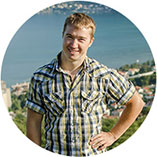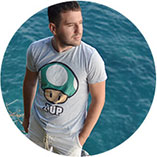Пройти курс Coursera 'Learning How to Learn'
This course gives you easy access to the invaluable learning techniques used by experts in art, music, literature, math, science, sports, and many other disciplines. We’ll learn about the how the brain uses two very different learning modes and how it encapsulates (“chunks”) information. We’ll also cover illusions of learning, memory techniques, dealing with procrastination, and best practices shown by research to be most effective in helping you master tough subjects.
Критерій завершення
курс пройден
Особисті ресурси
время
Екологічність мети
Я действительно этого хочу :)
-
Week 1. What is Learning? Focused versus Diffuse Thinking
-
Lecture: Introduction to the Focused and Diffuse Modes
-
Lecture: Terrence Sejnowski and Barbara Oakley--Introduction to the Course Structure
-
Info: Welcome to Learning How to Learn!
-
Info: How to Use Discussion Forums
-
Lecture: Using the Focused and Diffuse Modes--Or, a Little Dali will do You
-
Lecture: What is Learning?
-
Introductory Quiz
-
toDo: Get to Know Your Classmates
-
-
Week 1. What is Learning? Procrastination, Memory, and Sleep
-
Lecture: A Procrastination Preview
-
Lecture: Practice Makes Permanent
-
Lecture: Introduction to Memory
-
Lecture: The Importance of Sleep in Learning
-
Lecture: Interview with Dr. Terrence Sejnowski
-
-
Week 1. What is Learning? Summary, Review
-
Summary video for Module 1
-
Excitement About What's Next! MaryAnne Nestor Gives Special Hints
-
Quiz: What is Learning?
-
-
Week 1. What is Learning? Optional materials
-
Interview with Dr. Robert Bilder on Creativity and Problem Solving
-
Interview with Writing Coach Daphne Gray-Grant
-
Interview with "Benny the Irish Polyglot" about Learning Languages
-
A Posting about Anxiety, Depression and PTSD from a Learner in Learning How to Learn
-
-
Week 2. Chunking. The Essentials
-
Lecture: Introduction to Chunking
-
Lecture: What is a Chunk?
-
Lecture: How to Form a Chunk - Part 1
-
Lecture: How to Form a Chunk - Part2
-
Lecture: Illusions of Competence
-
Practice Quiz: Retrieval Practice
-
-
Week 2. Chunking. Seeing the Bigger Picture
-
Lecture: What Motivates You?
-
Lecture: The Value of a Library of Chunks
-
Lecture: Overlearning, Choking, Einstellung, and Interleaving
-
Lecture: Summary
-
Practice Quiz: Retrieval Practice
-
Review Quiz: Chunking
-
-
Week 3. Procrastination
-
Lecture: Introduction to Procrastination and Memory
-
Lecture: Tackling Procrastination - It's Easier, and More Valuable, Than You Think
-
Lecture: Zombies Everywhere
-
Lecture: Surf's Up: Process Versus Product
-
Lecture: Harnessing Your Zombies to Help You
-
Lecture: Juggling Life and Learning
-
Lecture: Summing Up Procrastination
-
Practice Quiz: Retrieval Practice
-
-
Week 3. Memory
-
Lecture: Diving Deeper into Memory
-
Lecture: What is Long Term Memory?
-
Lecture: Creating Meaningful Groups and the Memory Palace Technique
-
Lecture: Summing Up Memory
-
Practice Quiz: Retrieval Practice
-
Quiz: Procrastination and Memory
-
-
Week 4. Renaissance Learning and Unlocking Your Potential I
-
How to Become a Better Learner
-
Introduction to Renaissance Learning and Unlocking Your Potential
-
Create a Lively Visual Metaphor or Analogy
-
No Need for Genius Envy
-
Change Your Thoughts, Change Your Life
-
Practice Quiz: Retrieval Practice
-
-
Week 4. Renaissance Learning and Unlocking Your Potential II
-
The Value of Teamwork
-
A Test Checklist
-
Hard Start - Jump to Easy
-
Final Helpful Hints for Tests
-
Summary
-
Wrapup to the Course by Terrence Sejnowski and Barbara Oakley
-
Practice Quiz: Retrieval Practice
-
Quiz: Final
-
-
Week 2. Chunking. Optional
-
Reading: Chunking
-
Optional Interview with Dr. Norman Fortenberry - Learning at MIT
-
Optional Interview with Scott Young, a "Marco Polo" of Learning
-
Optional Interview with Author Amy Alkon
-
-
Week 3. Optional Interviews
-
Optional: Caroline Mitchell on Learning Something Difficult that Others Think isn't "You"
-
Optional Interview with 4 Time US Memory Champion Nelson Dellis
-
Optional Interview with Dr. Robert Gamache, an Award-winning Bilingual Scientist
-
Optional Interview with Stanford's Keith Devlin, the NPR "Math Guy"
-
-
Week 4. Optional
-
Reading: Renaissance Learning and Unlocking Your Potential
-
Optional: Part 1: How NOT to Take a Test, Interview with Dr. Richard Felder and Dr. Rebecca Brent
-
Optional: Part 2: Learning Something New, Interview with Dr. Richard Felder and Dr. Rebecca Brent
-
Optional: Part 3: The Imposter Syndrome and Dealing with Procrastination, Interview with Dr. Richard Felder and Dr. Rebecca Brent
-
Optional: Writer John Maguire (readablewriting.com) on the Importance of Putting Objects in Your Writing
-
Optional Interview with William Craig Rice on learning in the humanities
-
- 5925
- 02 листопада 2015, 13:31
Не пропустіть нові записи!
Підпишіться на ціль і стежте за її досягненням



